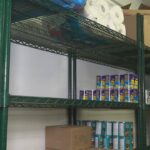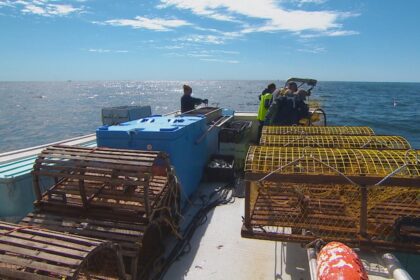British ColumbiaAn agreement, signed today, between all Canadian provinces, territories, and the federal government, will drop interprovincial trade barriers on many goods except food and alcohol. It’s part of an effort to provide businesses with more trade opportunities in light of U.S. tariffs.Trade agreement to take effect in DecemberEmily Fagan · CBC News · Posted: Nov 19, 2025 1:13 PM EST | Last Updated: 12 hours agoListen to this articleEstimated 3 minutesThe audio version of this article is generated by text-to-speech, a technology based on artificial intelligence.B.C. Jobs and Economic Growth Minister Ravi Kahlon signs an agreement to reduce interprovincial trade barriers in his office at the B.C. Legislature on Wednesday, Nov. 19, 2025. (Emily Fagan/CBC)An agreement between all Canadian provinces, territories, and the federal government signed today will drop interprovincial trade barriers on many goods except food and alcohol starting in December. It comes as part of an effort to support businesses with more trade opportunities in light of U.S. tariffs.B.C. Minister of Jobs and Economic Growth Ravi Kahlon said the agreement, signed in Yellowknife on Wednesday, is the outcome of a nationwide push led by B.C. to reduce domestic trade barriers.“This agreement makes it easier for goods that meet the rules in one province or territory to be sold across Canada without extra approvals, labels, or testing,” he said at an announcement in Victoria. “We are creating one agreement, one market, and unlimited opportunity across the country.”When it goes into effect, the agreement will cover thousands of products, including clothing, toys, vehicles, health technology, and industrial products. Kahlon hopes to expand this to include food, alcohol, and other things initially exempt from the agreement like financial services – but said they are regulated differently, and it will take time to sort out.“The business community has long called for a simple principle: if a product is approved for sale in one province, it should be approved in all provinces,” said Bridgitte Anderson, president and CEO of the Greater Vancouver Board of Trade.“While today is worth celebrating, it is important to encourage the momentum towards further integration and opportunity domestically, especially as we look towards food and alcohol, as well as improving labour mobility.”B.C. Jobs Minister Ravi Kahlon stands with Greater Vancouver Board of Trade president and CEO Bridgitte Anderson and MLA Paul Choi at an announcement of an agreement to reduce interprovincial trade barriers. (Emily Fagan/CBC)James Donaldson, CEO of the B.C. Food and Beverage Association, said provinces have different safety standards around food, particularly meats, so he wasn’t surprised that it may take longer to lower trade barriers on it. “I think it’s progress, because we’ve been talking about this for some time, so it’s nice to see them actually taking some action,” he said.“Maybe … a side benefit of some of the tariff threats that Canada’s faced is that it’s kind of forcing the provinces to work together in a more constructive way.”Donaldson wants the country to determine a unified set of food safety standards to make it easier to lower trade barriers. He also hopes alcohol will soon be included in expanded interprovincial trade opportunities. B.C. has signed a memorandum of understanding to support direct-to-consumer alcohol sales with other provinces.However, Marc Lee, senior economist with the Canadian Centre for Policy Alternatives, says the agreement amounts to “political theatre,” aimed at addressing barriers that have little impact on sectors beyond food and alcohol.Earlier this year, research co-authored by Lee on interprovincial trade found that removing trade barriers will have little effect on Canada’s economy, but deregulation could hurt public interest measures like environmental and consumer protections.“They seized on this kind of bogus issue of trade barriers and are basically painting themselves as the knights in shining armor that are going to go slay this dragon, but the reality is, there’s no dragon,” Lee said.“The real barriers for businesses and trading across Canada are distance and transportation costs.”
Provinces sign agreement to drop interprovincial trade barriers on goods except food, alcohol











